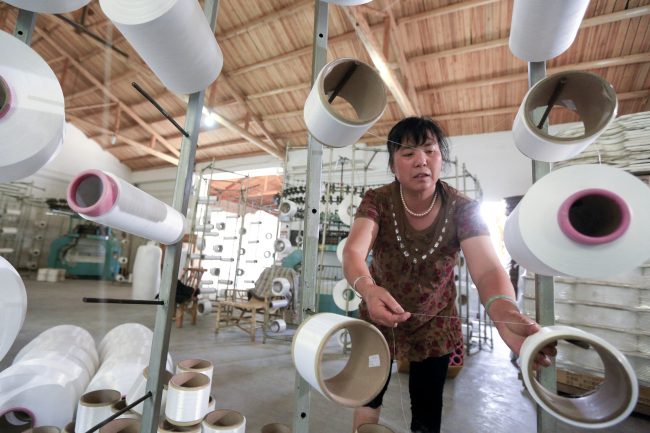Koda Ltd. Executive Director Ernie Koh has a message for clients in 50 countries who complain about the Singapore-based furniture maker’s first price increase in two years: Take it or leave it.
Koda’s factories in China, Malaysia and Vietnam are battling rising costs as governments in Asia increase minimum wages to curb discontent over a widening wealth gap. While weak global growth and increased competition limited the ability of producers to raise prices during the past five years, Koh says they can’t go on absorbing the additional expenses.
“We aren’t even passing on the full costs,” said Koh, who counts U.S. retailer Williams-Sonoma Inc., owner of Pottery Barn, and Cost Plus Inc. among customers. “Wage escalation in China these past few years has been crazy. We have collective bargaining with the union in Vietnam, and in Malaysia there is a big outcry among manufacturers over the minimum wage.”
 |
An employee works in a factory producing textiles in Shaoxing, Zhejiang Province, China. (Bloomberg) |
Average pay in Asia almost doubled between 2000 and 2011, compared with a 5 percent increase in developed countries and about 23 percent worldwide, according to the International Labour Organization in Geneva. The gain was led by China, where average remuneration more than tripled during the period. Southeast Asia is catching up, with new minimum pay levels in at least five nations eroding companies’ ability to make cheap toys, clothes and furniture.
“Producers are no longer able to absorb rising wage costs and ultimately will have to jack up prices for consumers in the West,” said Frederic Neumann, co-head of Asian economics research at HSBC Holdings Plc in Hong Kong and a former consultant on Asian economics and politics to the World Bank. “It’s the manufacturing hub of the world, and if prices rise here, then inevitably the global price level will have to rise as well.”
The threat of inflation prompted Pacific Investment Management Co., which runs the world’s biggest bond fund, to plan Asia’s first fund to protect against it. The investment will aim to return at least 2 percentage points more than the average consumer-price gains in Singapore and Hong Kong, Michael Thompson, head of Pimco’s wealth-management group for the region excluding Japan, said in a March 7 interview in Singapore.
Singapore’s inflation quickened to 4.9 percent in February compared with an average 2.6 percent in the past decade, while in Hong Kong, consumer prices rose 4.4 percent, more than double the 1.9 percent 10-year average.
In a survey of 1,546 Chinese exporters by Global Sources Ltd. published in November, companies cited rising or high production and labor costs as the biggest challenge they face.
Koda’s Koh and other producers looking to pass on the increases to customers are being helped by indications of a global recovery that’s boosting shares and reviving investment from the U.S. to Japan. The MSCI World Index of global stocks has risen 24 percent in the past 10 months.
U.S. orders for non-military capital goods excluding aircraft, a proxy for companies’ future business spending on equipment and software, rose 9.8 percent in the three months through January, the most for a three-month period since 1993.
“There are brighter signs in the world economy, Asia’s demand has been strengthening, and we are seeing a pick-up in industrial activity,” said Tomo Kinoshita, an economist at Nomura Holdings Inc. in Tokyo. “That means Asian companies can start to gradually increase margins again.”
In Jakarta, the capital of Indonesia and home to 10 million people, Governor Joko Widodo last year approved a 44 percent increase in minimum pay for workers, to 2.2 million rupiah ($226) a month. The national government is considering extending the plan across the country, which has the world’s fourth-largest population, after China, India and the U.S.
Thailand raised its national daily minimum wage to 300 baht ($10) in January. Malaysia introduced a base salary last year, benefitting about 3.2 million workers before elections that must be held within three months. A similar tactic helped Taiwanese President Ma Ying-jeou, who won a second term in 2012 after increasing the lower limit on earnings by 5 percent.
Asia’s manufacturing success ― the region makes all of Apple Inc.’s iPhones and supplies about 38 percent of U.S. imports ― also is boosting the region’s currencies, making exports even more expensive. (Bloomberg)








![[Weekender] Korea's traditional sauce culture gains global recognition](http://res.heraldm.com/phpwas/restmb_idxmake.php?idx=644&simg=/content/image/2024/11/21/20241121050153_0.jpg)